When should you neuter your dog? This blog explores the right timing for spaying and neutering so you can reap the best benefits.
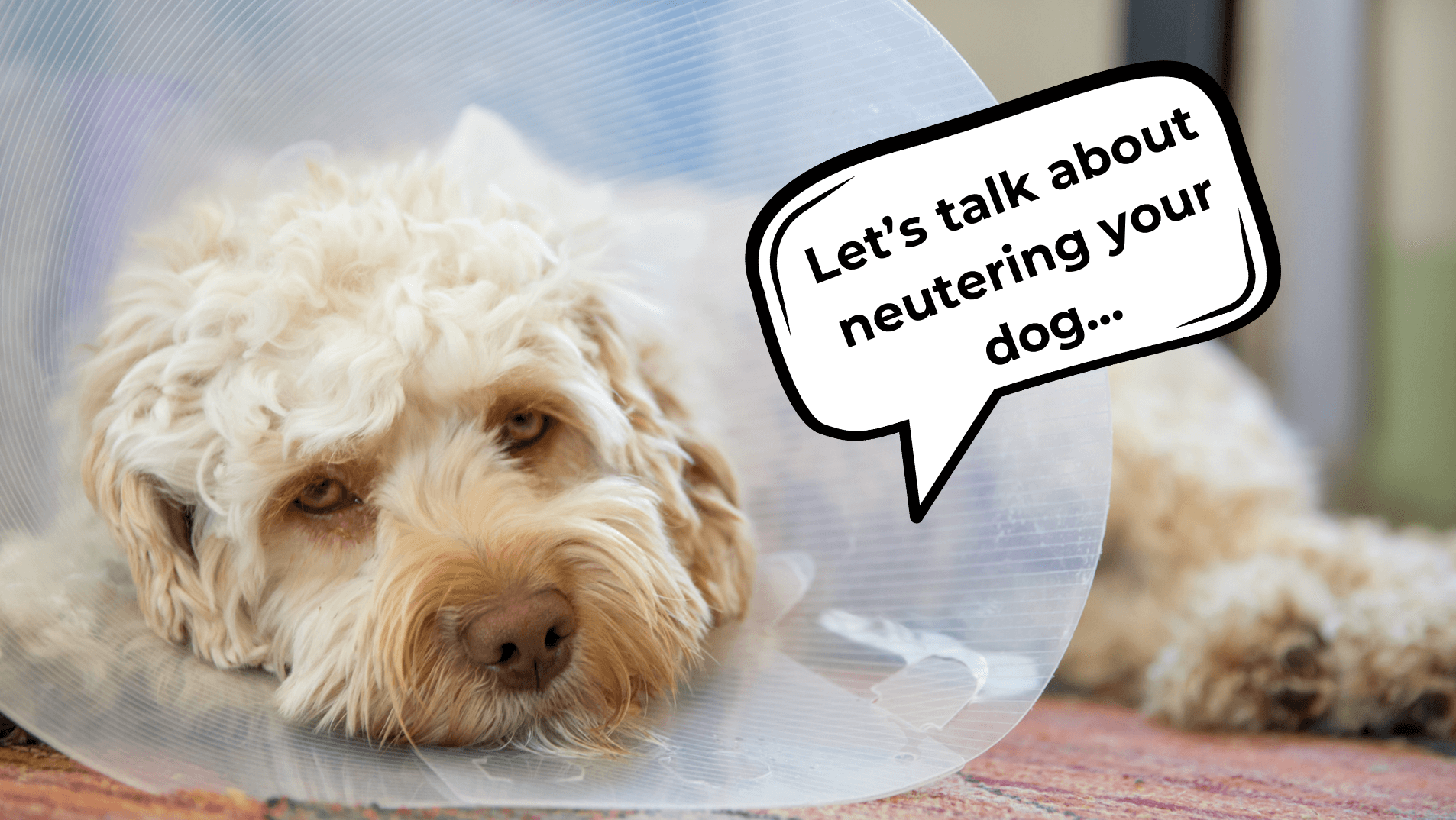
Ahh, the cone of shame…
Spaying and neutering household pets is a common and well-praised practice.
It reduces the risk of accidental breeding, which could land even more dogs in shelters.
And up until recently, it was recommended that you spay or neuter your dog as soon as physically possible, or around four to six months, which many shelters still do today to prevent unwanted litters.
But the question remains: when is it best to have your dogs neutered?
Read on to learn more.
Key Takeaways
- Healthier Dogs: Spaying or neutering significantly contributes to a dog's overall health and longevity. For large breed dogs or giant breeds, it's especially crucial to consult with your veterinary medicine professional regarding the optimal timing of the procedure, as early spaying/neutering can have potential risks. However, the benefits are clear: spaying drastically reduces the risk of mammary cancer in females, while neutering eliminates testicular cancer risk in males. By preventing these serious health issues, you're increasing the chances of having a happy, healthy dog for years to come.
- Breed-Specific Considerations: While spaying or neutering is generally recommended for all dog breeds, the ideal timing can vary. Small and toy breeds mature faster and can often be spayed or neutered earlier (around 6-9 months). Larger breeds mature slower, and often, it's best to wait until they are over a year old. This difference in timing is important to understand, and your veterinarian can provide breed-specific guidance to ensure the procedure is done at the right time for your dog's development.
- Behavioral Management: Spaying or neutering can help mitigate unwanted behaviors associated with hormones. In males, neutering can reduce aggression, roaming, and marking. In females, spaying eliminates heat cycles and their associated behaviors like vocalization and attracting unwanted attention. While training is always crucial for a well-behaved dog, spaying/neutering can be a valuable tool in managing certain behaviors and making your dog a more pleasant companion.
Table of Contents
Should You Go For Early Neutering?
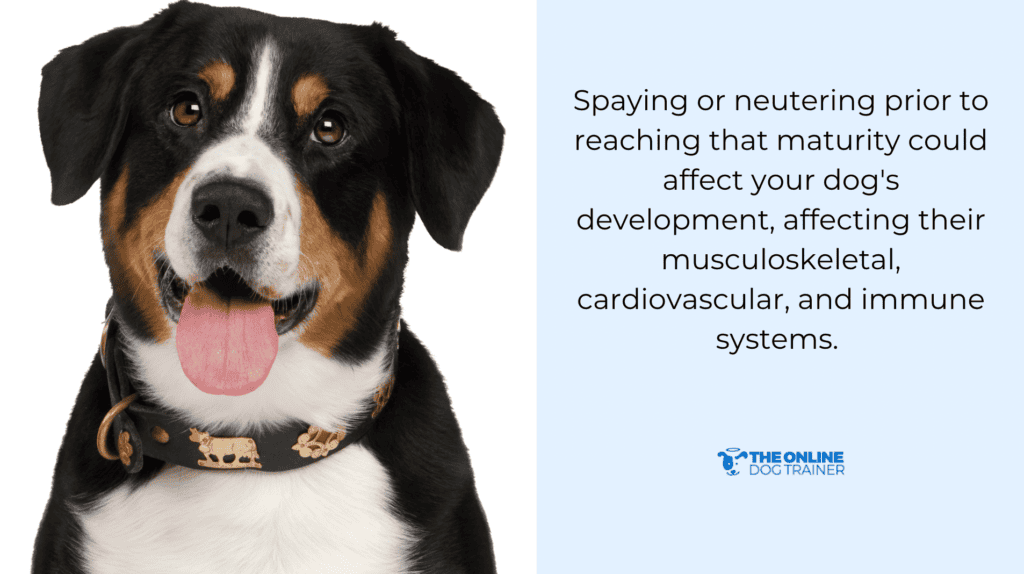
What happens if you get your dog fixed too soon?
It all depends on when your dog reaches their sexual maturity. Spaying or neutering prior to reaching that maturity could affect your dog's development, affecting their musculoskeletal, cardiovascular, and immune systems.
Sex hormones are very important in the proper development of any animal (especially healthy dogs!), and household pets are no different.
FREE CLASS: SOLVE DOG BEHAVIOR ISSUESIf your dog is fixed too soon, it could lead to joint issues like hip or elbow dysplasia, urinary incontinence, and even some cancers like lymphoma.
That probably sounds scary to you, but let me be clear…
The benefits of spaying or neutering your dog outnumber the risks of doing it too early. So even if you've already spayed or neutered your pup or you're planning to do it early to prevent an oopsie, you're still doing what's best for your dog.
Having all the information can help you make the best decision for your pup.
Neutered Dogs: What Does It Mean To Have Your Dog Neutered or Spayed?
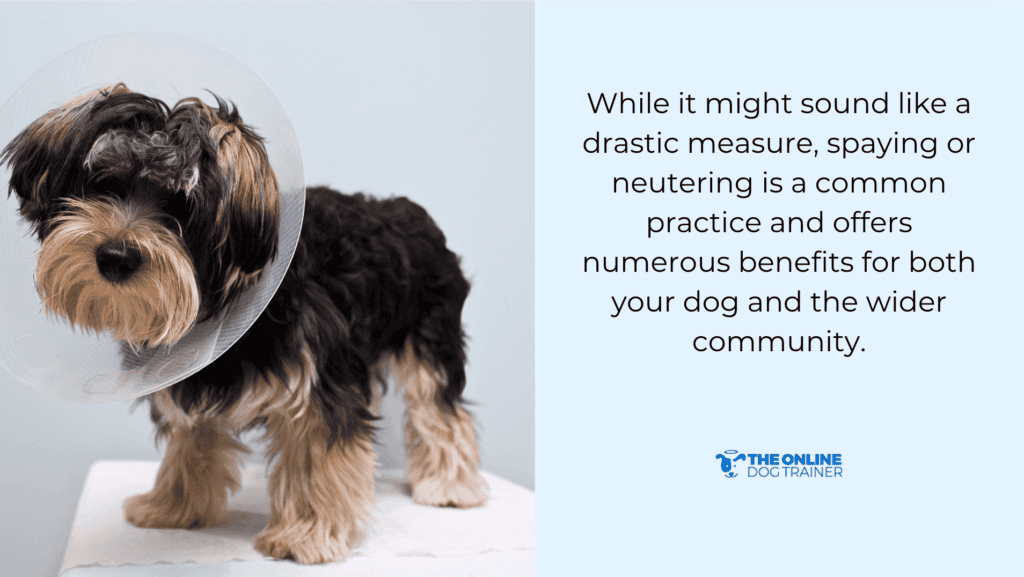
Neutering or spaying your dog refers to a surgical procedure that removes their reproductive organs, rendering them unable to reproduce.
- For male dogs (neutering): This involves the removal of the testicles.
- For female dogs (spaying): This typically involves the removal of the ovaries and uterus.
While it might sound like a drastic measure, spaying or neutering is a common practice and offers numerous canine health benefits for both your dog and the wider community.
FREE WEBINAR: UNDERSTANDING DOG BEHAVIORDifference Between Intact Dogs and Neutered Dogs
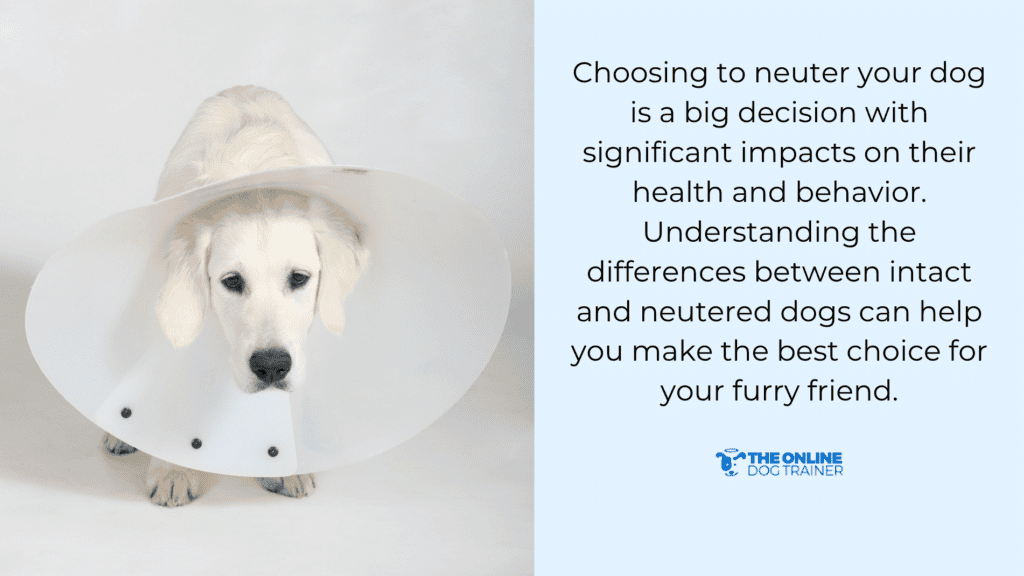
Choosing to neuter your dog is a big decision with significant impacts on their health and behavior. Understanding the differences between intact and neutered dogs can help you make the best choice for your furry friend. Let's explore how spaying or neutering can affect your dog's reproductive capabilities, hormones, health risks, and even appearance.
Intact Dogs
- Reproductive Capability: An intact dog has all its reproductive organs. Males have their testicles, and females have their ovaries and uterus. This means they are capable of reproducing.
- Hormones: Intact dogs experience the full range of hormonal influences. This can lead to certain behaviors like marking territory (males), going into heat (females), and potentially increased aggression or roaming tendencies.
- Health Risks: Intact dogs are at a higher risk for certain reproductive cancers and infections. For example, males are at risk for testicular cancer, while females are at risk for mammary cancer and uterine infections.
- Appearance: Intact males may have larger testicles, and their overall physique might be slightly more muscular due to testosterone.
Neutered Dog
- Reproductive Incapability: A neutered dog has had its reproductive organs surgically removed. Males have had their testicles removed (castration), and females have had their ovaries and uterus removed (spaying). They cannot reproduce.
- Hormonal Changes: Neutering significantly reduces hormone levels. This often leads to a decrease in hormone-driven behaviors like marking, roaming, and aggression. Females no longer experience heat cycles.
- Health Benefits: Neutering eliminates the risk of testicular cancer in males and significantly reduces the risk of mammary cancer in females, especially when done before the first heat cycle. It also prevents uterine infections in females.
- Appearance: Neutered males may have a slightly less muscular build due to lower testosterone levels.
Benefits of Having Your Dog Spayed or Neutered
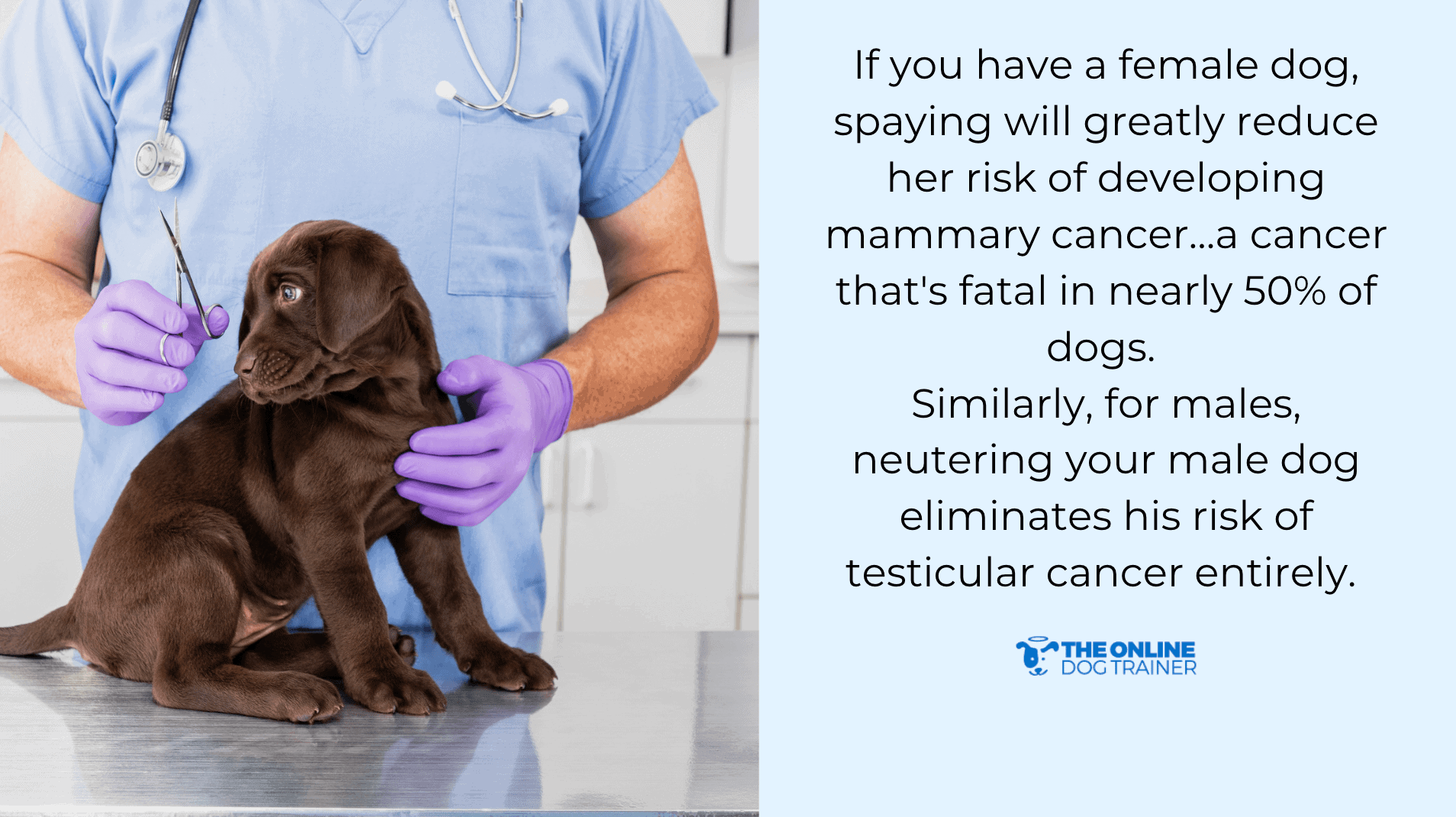
I've already mentioned it, but pet owners, if your dog is in situations where unwanted breeding and pet overpopulation might occur, spaying or neutering is the surefire way to prevent this from happening.
Aside from breeding prevention, spaying and neutering your dog delivers a heap of health benefits.
If you have a female dog, spaying will greatly reduce her risk of developing mammary cancer…a cancer that's fatal in nearly 50% of dogs.
Similarly, for males, neutering your male dog eliminates his risk of testicular cancer entirely.
Behaviorally speaking…spaying and neutering can help avoid unwanted behaviors.
For females, that means your pup won't have heat cycles, and you won't have to deal with howling, crying, or erratic activities that come with those hormonal shifts.
For males, this means you won't have to worry about your dog constantly marking inside your home or roaming around to find a mate.
Spaying or neutering can help prevent infections, like uterine infection, that can be costly to treat.
So, I must emphasize that it IS a good thing to get your dog spayed or neutered.
But…when is the best time??
UNDERSTAND DOG BEHAVIOR: FREE WEBINAR HEREThe Best Age to Spay or Neuter Your Dog
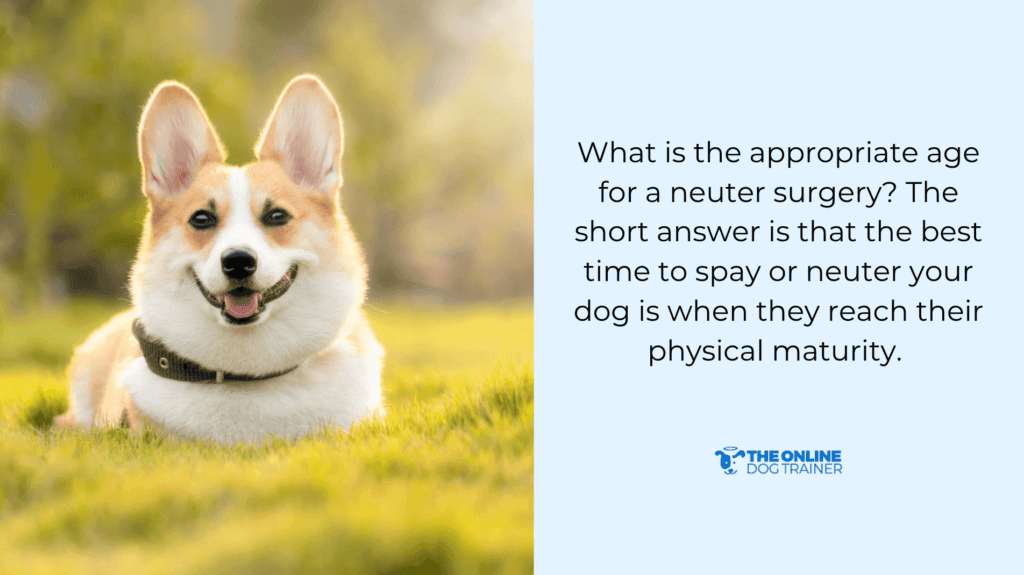
What is the appropriate age for a neuter surgery? The short answer is that the best time to spay or neuter your dog is when they reach their physical maturity.
Now…I say the short answer because it's much more complicated than that, as different breeds of dogs reach their sexual maturity at very different times.
For example, small dogs and toy breeds mature at an early age, around six to nine months old. Smaller dogs are less likely to suffer from the adverse effects of early spaying or neutering, simply because their body is maturing at a faster rate.
The larger breeds (for example, large breed male dogs) mature much later, and for them you'll want to consider waiting until they're older to spay or neuter.
I'm talking over one year old.
That's because some large breeds don't mature until they're 16-18 months old!
To break it down for you…
If you have a small-breed pet dog, they will likely experience no issues with getting spayed or neutered early on.
If you have a large-breed dog, there are many risks associated with spaying or neutering too early, so it's best to wait until they're older (1+ year) to get them fixed.
If you have questions about neutering pets, it's always best to discuss them with your vet.
Let's say you've decided to wait until your pup is older to get them spayed or neutered. How do you keep them out of trouble in the meantime?
An intact dog will require your constant supervision.
Unspayed female dogs (intact females) attract male dogs (even from miles away), so you'll want to keep an eye on her at all times so stray dogs don't come wandering into your yard. A fence can help tremendously, and I've even seen people carry an umbrella on walks to ward off any male suitors.
Unneutered male dogs can get forceful. With all the testosterone coursing through their bodies, if a nearby female is in heat, there's no way to predict how an unneutered male dog might act. Keeping an eye on your dog and always having them on a leash when outside can ensure that they don't try to break into a neighbor's yard to mate with another female.
FREE DOG BEHAVIOR CLASSWhat About Dogs with Behavioral Issues?
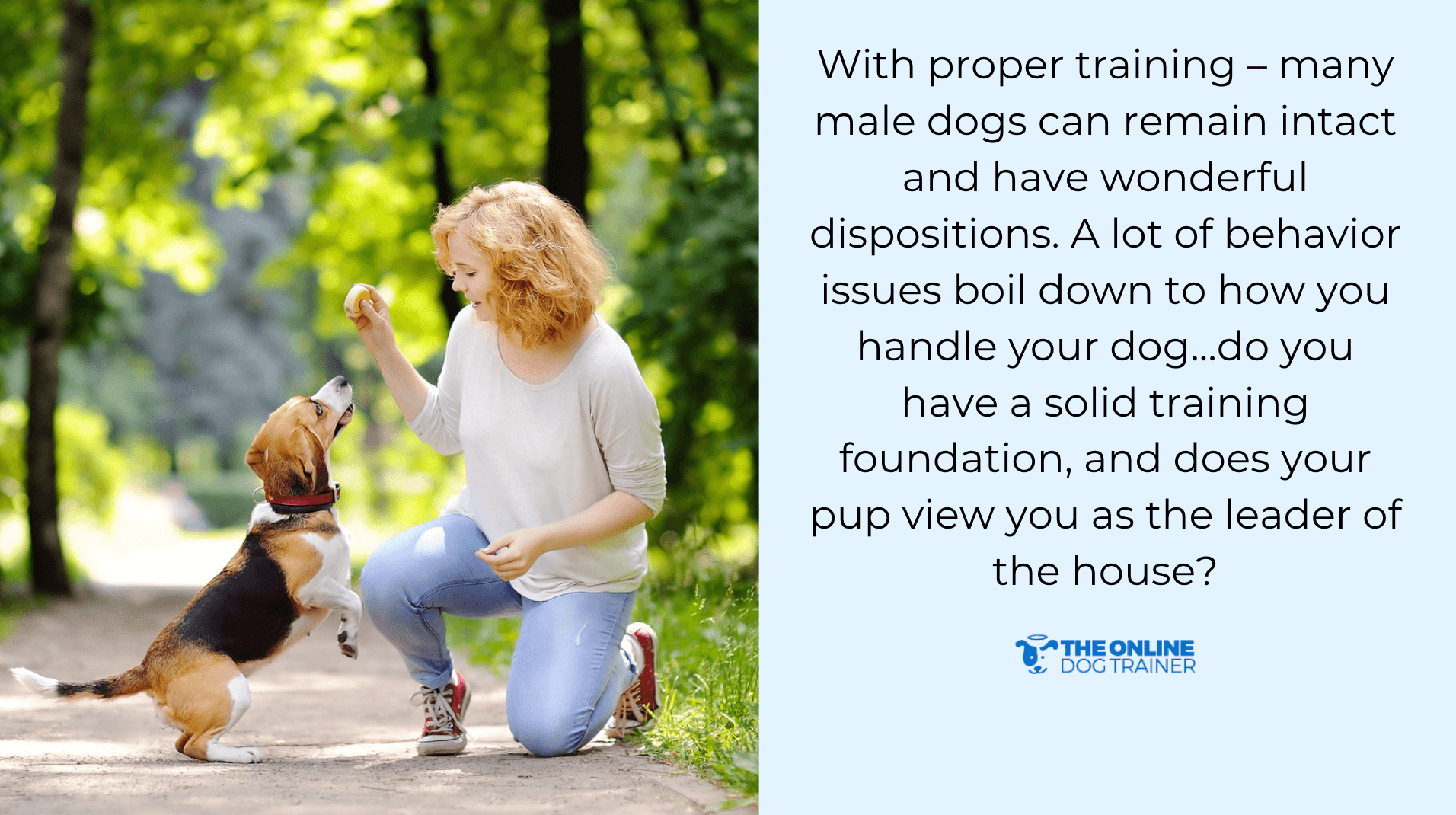
You might have heard that neutering your dog can help curb some of their aggression. And there is some truth to that (as I just mentioned, how un-neutered males can become forceful).
So, if you're finding that your good little boy is becoming more and more aggressive, then getting them neutered earlier might be the best solution for you.
That being said — with proper training — many male dogs can remain intact and have wonderful dispositions. A lot of behavior issues boil down to how you handle your dog…do you have a solid training foundation, and does your pup view you as the leader of the house?
When you have an appropriate relationship with your dog via training, you can let them know what behaviors are acceptable (playing a friendly game of tug) and what behaviors are not (marking inside the house).
GET THE DOG CALMING CODE FOR FREEIf you want to set a strong foundation of training for a lifetime of learning, I would love it if you checked out my Dog Calming Code™ program.
It centers around the relationship you have with your dog, and helps you communicate with them in a language that they can understand.
So you both walk away with trust, friendship, and, best of all, an obedient dog that will listen to you anywhere.
And remember, the best time to get your dog spayed or neutered is when it's best for you…
…but if you do have a larger breed, you might want to consider waiting until they've fully matured to avoid any health risks.

~Doggy Dan 🙂




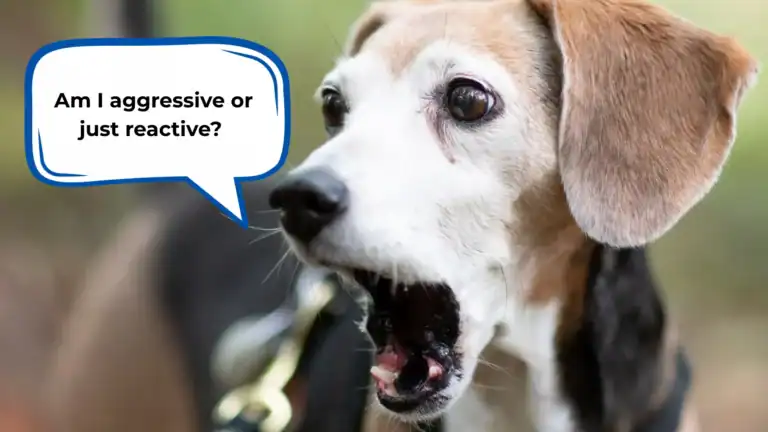
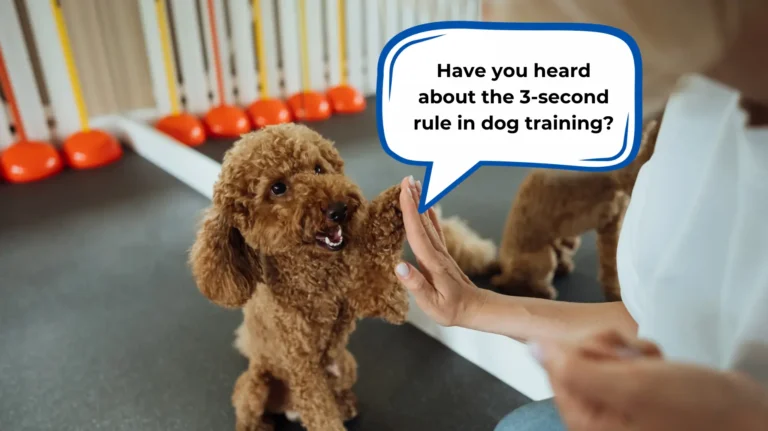
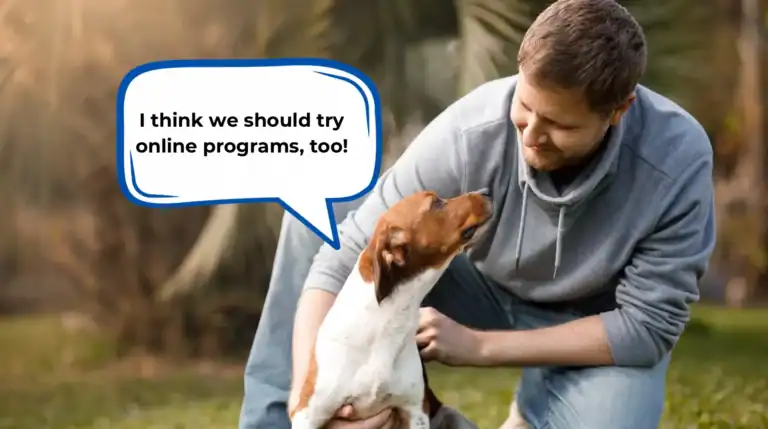
15 Responses
This is what the science says about neutering or spaying dogs. Thanks for keeping up with the science and keeping your pack informed.
Hi. Thanks for this post. I had to look into my dog’s records to see if I’d done it right. He’s was 41 lb and 15 months when he was neutered. He’s happy and healthy, thank God. This post was very reassuring, too.
Thanks for your feedback Mary!
There are so many differing opinions when it comes to spaying/neutering dogs and my Blog was really aimed at informing dogs owners if they are a bit confused by it all. All the Best, Doggy Dan
I am a married active 75 year old male. I live in the Adirondacks, lots of outdoor activities. Active but slowing down, no more running or mountain climbing. I have owned a few dogs in the past. I am researching dogs right now and kind of like the Spanish Water Dog but still open to other choices that may be less expensive. Can you help me select and prepare for a new member to our family?
Hi David, one of the most important thing when choosing a puppy to suit your family is to focus on the personality of the puppy. Many people will focus on a breed, and it’s fine to have personal preferences here, but when it comes to behaviour it is the personality of the puppy that is most important. For example an owner is after a more sedentary dog then choosing a puppy with a very outgoing and hyperactive personality may not be the best idea, similarly if an owner wants an active driven dog and they choose a cal,er personality puppy. A good breeder will be able to guide you in your selection and should be interested in what type of puppy you are looking for.
As far as getting everything off on the right foot, and raising a happy and well-behaved puppy, then my website TheOnlineDogTrainer.com shows you very clearly how to achieve this…maybe take a quick look…its a $1USD trial for 3 days…All the Best, Doggy Dan
I would like to see a very detailed video showing how the harness is put on the dog. I have a puppy miniature poodle. Does this harness prevent the dog from jerking backwards & escaping from the harness? Like I said I would appreciate seeing a detailed video of how to put on the harness and demonstrate how the dog cannot jerk backwards & escaping the harness. Thank you.
Hi Emily, the link below will show you how the harness is fitted! Doggy Dan
https://shop.theonlinedogtrainer.com/harness-fitting-sizing/
Thanks for the information. We have a Chiweenie, he’s a year old and we going to get him neutered, for health purposes, and to calm him down. This is just what we needed to make that discussion.
I’m glad you found my Blog helpful in making an informed decision about your dog being neutered. At the end of the day we all need to make a judgment as to what is best for our dogs and us, and part of that is to have all the pros and cons listed out in front of us. However, if you have any questions or concerns then speak to your Vet and they will be able to guide you. All the Best, Doggy Dan
I already suscribe and find your training methods great. Just for your info, in some councils in Victoria Aus, the registration fee is higher for an unspayed dog. Also in Vic most reputable breeders automatically spay dog at 8 weeks. Otherwise you must sign a contract that you will not breed from that dog. Breeders must notify your council of your purchase. These laws were implemented with the clamp down of puppy farms in Victoria not sure what happens in other states.
Thanks for sharing that information Liz! Those regulations make perfect sense and I absolutely agree with any laws that aim to stamp out puppy farming. All the Best, Doggy Dan
Love reading your posts. I find your information very useful. Thanks
Thanks Tim, thanks for your feedback and I’m really glad you liked my Blog! All the Best, Doggy Dan
We have a 15 month old Golden Lab, who has not experienced her 1st heat yet. We have 1/3 acre, but only a small portion is fenced. There are coyotes in our woods. When our girl starts her 1st heat, would she be vulnerable to male coyotes? What can I do to keep her safe, especially if she has to go out at night ? She has a 10 year old sister, a Golden Irish, and they always go out together. Our City Hall says our girls are safe if they’re over 35 pounds, (they attack adult deer, right???, and they’ll stay away if we re arrange patio furniture! Thanks!
Hi Susan,
If you are concerned about your dog going out in the night when she is heat then accompanying her outside and having her under control (on-leash) would be a good plan. As the article mentions, male dogs can cover a long distance to reach a female in heat and so it’s a good idea to supervise her or have her housed securely. Coyotes are slight in stature and tend to mainly hunt smaller prey, but it pays to always be cautious if they are present. All the Best, Doggy Dan